by Kendra Hughson | Feb 1, 2021
In the midst of the COVID-19 pandemic, many of us have turned to cooking more meals at home. Cooking meals and eating at home has many benefits. When preparing meals, you can select the ingredients and choose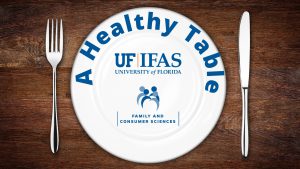 healthy recipes lower in saturated fats, sodium, and sugar. When eating out, we tend to eat more food. You can more easily control your portion sizes when eating at home. Remember to include a variety of fruits and vegetables in your main dishes and side dishes. Finally, preparing and eating meals together is not only a fun way to teach healthy eating habits and cooking skills, but it is also a great way to connect with each other at the end of the day.
healthy recipes lower in saturated fats, sodium, and sugar. When eating out, we tend to eat more food. You can more easily control your portion sizes when eating at home. Remember to include a variety of fruits and vegetables in your main dishes and side dishes. Finally, preparing and eating meals together is not only a fun way to teach healthy eating habits and cooking skills, but it is also a great way to connect with each other at the end of the day.
We invite you to join us for A Healthy Table: Virtual Cooking School. In our virtual cooking school, you will learn how to prepare healthy meals for your family through self-paced online lessons and hands-on cooking activities. You will have opportunities to engage in monthly live virtual cooking demonstrations and interactive learning experiences.
Register before February 9th and save 20% off the ticket price. Early registrants gain access to a bonus class and kick-off event. Tickets are on sale for $19.99 until February 9th and $25 thereafter. Registration will close on February 23. Once registered, you will receive the Zoom class link and the link to the class website. Register here: http://bit.ly/ahealthytable.
The monthly Zoom class events will be held from 6:30-7:30 pm CT/ 7:30-8:30 pm ET on:
- Tuesday, February 9th: Kickoff Event Available for Early Birds only Program introduction and a sweet, healthy treat demonstration.
- Tuesday, February 23rd: Lesson 1, Kitchen skills primer
- Tuesday, March 23rd: Lesson 2, Cooking techniques – baking, grilling, roasting
- Tuesday, April 27th: Lesson3, Simple dishes – eggs, breads, salads, pasta
- Tuesday, May 25th: Lesson4, One dish meals – one-pot, slow cooker, packet meals
- Tuesday, June 22nd: Lesson 5, Entertaining and special occasions – setting a table, appetizers
Come cook with us and set your table for better health.
References:
Benefits of Cooking at Home
Cooking at Home for Healthier Eating
Benefits of Family Meals

by Melanie Taylor | Feb 1, 2021

Melanie Taylor, Family & Consumer Sciences, Extension Agent III, Bay County
Melanie Taylor grew up in Virginia. After getting married in January 2009 and wanting to support her husband’s career in Panama City, she officially moved to Bay County. Melanie received her bachelor’s degree from Radford University. She then furthered her education with a M.S.Ed from Virginia Tech in 2004 while working full time for Virginia Cooperative Extension. She followed in her Dad’s footsteps by becoming a 4-H youth development Extension agent and worked with Virginia Extension for over eight years. Upon moving to Bay County, she worked in Gulf County as the 4-H and Family & Consumer Sciences Extension Agent for 10 years. She transferred to UF/IFAS Extension Bay County in December 2019. Her FCS focus areas are health and wellness, prevention of chronic diseases, and strengthening families within our communities.
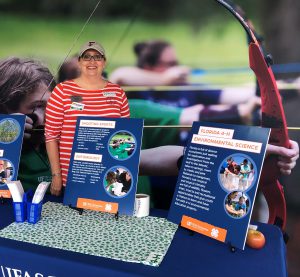
Melanie at the 4-H booth at the Sunbelt Expo
Melanie is very excited to now work within the community in which she lives and to assist with helping Bay County residents recover from Hurricane Michael and Covid-19 damages. Be sure to contact Melanie if you have any needs in the area of family and consumer sciences. She is ready and willing to answer questions and design programs virtually for now and face-to-face in the future.
Like so many in Bay County, Melanie’s home in the Cove was severely damaged by Hurricane Michael, but she is excited to announce they finally moved back into their repaired home on September 26. She and her family could not be happier (her family includes husband Bryan and their two cats, Sonny and Cali). Outside of work, Melanie is active in the Junior League of Panama City. It is very likely you will see her out and about with her husband at local events.
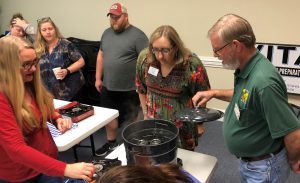
Melanie Taylor, Family & Consumer Sciences, Bay County

by Heidi Copeland | Jan 22, 2021
Taxes, without a doubt, conjure up emotions from elation to dread! Do you owe? Are you getting a refund? Are you uncertain?
doubt, conjure up emotions from elation to dread! Do you owe? Are you getting a refund? Are you uncertain?
This is a significant statement because income tax returns cannot be filed electronically or by mail until the IRS has opened the season.
Please, do not be influenced to apply for a tax refund loan, typically known as a RAL (refund anticipation loan), if you are not in a crisis for the money. An RAL is a loan based on the anticipated amount of your federal income tax refund. Many tax filing services will offer you a RAL if… you file with their service. Your loan amount will be the value of your anticipated refund minus fees and/or interest charges.
Know, too, that your loan will go directly to the lender once the IRS processes your income tax return.
Be VERY careful with refund anticipation loans. An obvious positive attribute of the loan is you get money quickly – before the season even opens. Another, once the lender receives your refund, the loan is paid. But, what happens if your tax refund is smaller than the anticipated income tax return? You now will have an outstanding loan that will need to be paid back.
The Earned Income Tax Credit (EIC or EITC) is a refundable tax credit for low- and moderate-income workers. For 2020, the earned income tax credit ranges from $538 to $6,660. The amount depends on income and number of children; people without kids can qualify, too.
If you qualify for the EITC, you need to know, by law, the IRS cannot issue refunds for people claiming the EITC or the Additional Child Tax Credit (ACTC) before mid-February. The IRS cannot release these refunds before February 15, but the IRS is saying to expect your refund by the first week of March. Note, too, the law requires the IRS to hold the entire refund − even the portion not associated with the EITC or ACTC. This law change, which took effect in 2017, helps ensure that taxpayers receive the refund they are due by giving the IRS more time to detect and prevent fraud.
Now, while waiting for the tax filing season to open, is a great time to get income tax documents together. Once the filing season opens, being organized and prepared will help facilitate a seamless transition to filing your income tax return. The IRS recommends that taxpayers file their returns electronically to reduce errors and receive refunds more quickly.
Filing an average income tax form is also easy. There are many FREE income tax filing sites.
Income $72,000 and below: Contact your local UF/IFAS Extension office and they can help you by:
- Finding FREE federal tax filing on an IRS partner site
- Finding guided preparation – simply answer questions
- Providing a link to a FREE Facilitated Self-Assisted (FSA) service with electronic forms you fill out and file yourself
Income above $72,000: Contact your local UF/IFAS Extension office and they can help you by:
- Providing a link to a FREE Facilitated Self-Assisted (FSA) service with electronic forms you fill out and file yourself
- Helping you learn how to prepare papers for meeting with a tax professional
- Providing you with basic tax preparation information
Be careful in your decision making when it comes to filing income taxes. Choosing e-file and direct deposit for refunds remains the fastest and safest way to file an accurate income tax return and receive a timely refund. It is amazing to know the IRS issues more than 9 out of 10 refunds in less than 21 days.
Source: https://www.irs.gov/filing/free-file-do-your-federal-taxes-for-free#what

by Marie Arick | Jan 21, 2021

Marie Arick, UF/IFAS Extension Liberty County
Marie Arick is in her second year as the UF/IFAS Liberty County Extension Director and 4-Agent. She also is the Family and Consumer Sciences Agent for both Liberty and Calhoun Counties. Marie has been with University of Florida IFAS since 2015, originally serving as the Family and Consumer Sciences Agent in Jackson County. She received her B.S. in Exercise Science and M.S. in Health Promotion from Mississippi State University. Her Extension specialty areas are health, wellness, food and nutrition, and 4-H youth development.
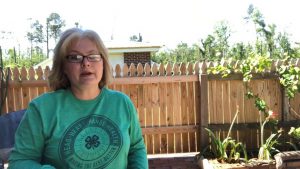
Marie Arick, Liberty County 4-H
Marie has provided many nutrition, food safety, and health and wellness educational programs/events including A Healthy Table Cooking School, Artisanal Cheese Making, Prevent T2: The National Diabetes Prevention Program, First-time Homebuyer, and the Annual Heart and Sole 5K. Her programming efforts in 4-H have included Food Challenge, Culinary Arts, Leadership, Community Service, and a variety of day camps and residential camps. Before joining UF/IFAS, Marie was employed with Texas A & M AgriLife Extension Service, where she was the Eastland County Extension Director and Family and Consumer Sciences Agent while also supporting 4-H programming.
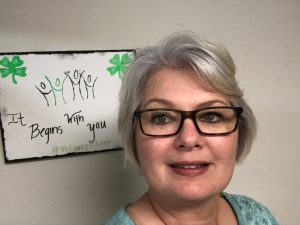
Marie Arick, UF/IFAS Extension Liberty County
Marie shares what she enjoys most about her career: “Being an Extension Agent is such a rewarding career, not only do I provide research-based education in my community, but I also reap the reward of watching participants gain knowledge, learn new skills, and apply those skills. I love having people share how they have improved their lives or used what they have learned. Some examples are a positive health outcome, achieving home ownership, successfully competing in a judging competition, or learning to prepare a new recipe.”
Contact Marie at 850-643-2229, jmarick@ufl.edu, or at her office located in the Liberty County Civic Center at 10405 NW Theo Jacobs Way, Bristol.

by Terri Keith | Jan 14, 2021
Setting a New Year’s resolution is a tradition for many people. Unfortunately, breaking those resolutions also seems to be a tradition. If your New Year’s resolution is to eat healthier, here are some tips to help you to be successful.
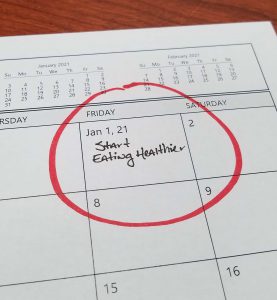
Photo Credit: Terri Keith, UF/IFAS Extension
First, you will be more likely to follow through on your resolution by setting a SMART goal. A SMART goal is one that is Specific, Measurable, Achievable, Relevant and Timed. You can find more information on setting a SMART goal here.
Second, know that eating healthier doesn’t necessarily mean going on a diet or avoiding all the foods you enjoy. Eating healthier can start with making simple substitutions to your favorite recipes, like using whole wheat pasta instead of refined grain pasta, or swapping out sodas and energy drinks for water or other unsweetened beverages. It could mean that you make a conscious effort to enjoy the foods that aren’t as healthy for you in moderation or work on lowering the amount of sodium/salt that you eat. There are many ways to eat healthier and if you need more suggestions, you can check out this article on 5 things to avoid eating.
Whether you are starting with simple steps or looking for more in-depth information, ChooseMyPlate from the USDA can be a useful resource. There, you can find information on daily recommended values for the different food groups, what counts as a serving, along with other resources, like recipes or healthy eating on a budget. You might be surprised to find out what counts as a serving!
Third, try involving your kids or other members of your household in working together to eat healthier. There’s even a section at ChooseMyPlate that focuses on healthier eating for families. It can be harder to stick with your resolution if you are the only one working on it because your shopping list can end up including more sweetened snacks than fruits and vegetables. If you need some inspiration to get started, you can find a few videos of recipes that were adapted from ChooseMyPlate here.
Eating healthier is a terrific goal any time of the year. If this is your New Year’s resolution, follow these tips and stick with it!

by Samantha Kennedy | Jan 14, 2021
Guess what, guys? We made it! We have finally put 2020 behind us and are now looking forward to 2021. I, for one, am hopeful. I am expecting great things from this year.
Admittedly, I have not always had an optimistic outlook. I used to like to say that I was a natural-born cynic. And while I still have cynical tendencies, I have learned strategies over this last challenging year that have really helped me look at things more positively and helped me deal with stress.
It all starts with mindfulness. While this has really become a bit of a buzzword in recent times, the foundations of mindfulness are solid and based on research. At its most basic, mindfulness refers to the practice of being in the moment. Sounds simple, right? Well, if your mental habits are as ingrained as mine were, it takes a lot of practice to be in the moment.
I am an overthinker. A brooder. A ruminator. As far back as I can remember, I have thought about things before I did them, then thought about them again for a long time afterwards. Especially if it was something I felt I had not done right or that did not go well. I would be driving or trying to sleep and thoughts, regrets, and recriminations would just be spinning, spinning, spinning endlessly in my head.
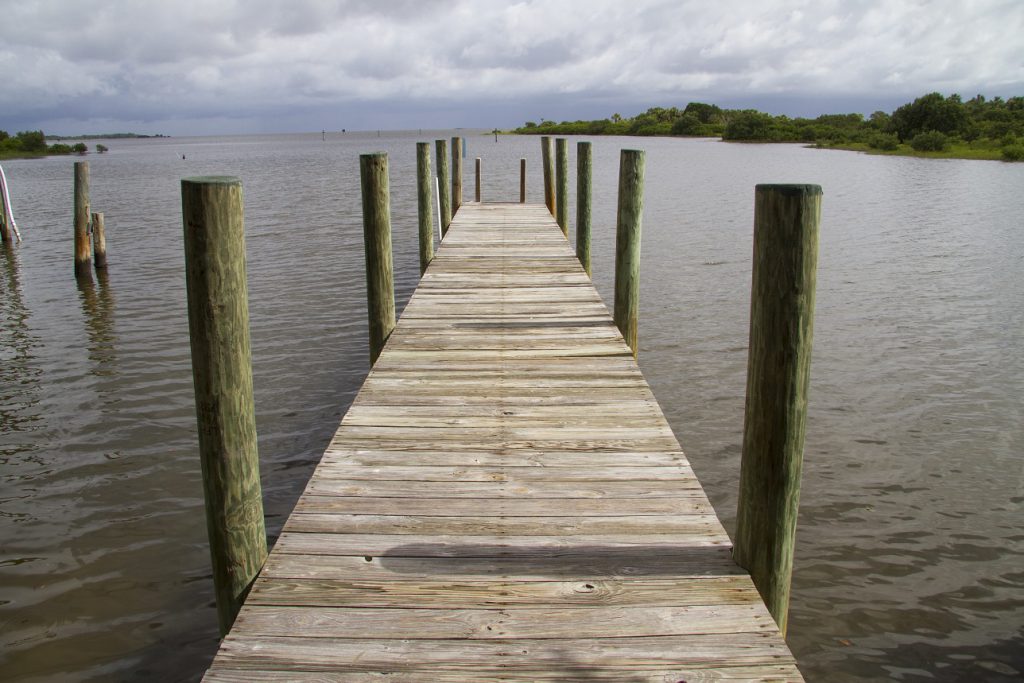
Spending time in a peaceful place without outside distractions is a great way to refresh and recharge. (Photo source: Marisol Amador, UF/IFAS)
This was just who I was. I had learned to live with it. I always knew that if something important was coming up, like an exam or a presentation, I would obsess about it beforehand to the point where I would lose sleep. If something happened that did not go well, I would fixate on it for days afterward.
It was stressful, but I dealt with it. And then 2020 happened.
Suddenly, I could not deal with it anymore. My obsessive ruminations and self-recriminations were suddenly unmanageable in the midst of the social isolation and worries brought on by the strains of a global pandemic.
I needed to find a way to change my outlook. A way to deal effectively with the overwhelming feelings I was experiencing. I wanted to be more positive. I wanted to stop seeing doom over every horizon. Most of all, I wanted to stop obsessing about everything all the time.
So I started reading about mindfulness. Then I started trying to practice it. I say “trying” because there are still days where I am just not feeling it, where I am just not able to find that quiet space inside myself that I need to tap into to be in the moment. However, I have gotten better at it with practice.
The key is breathing. Focusing on my breath – each inhale and each exhale, one after the other – allows me to feel centered, to relegate my other thoughts to the background. When outside thoughts arise, I have learned how to push them away and concentrate on the moment. And the next one. And so on.
The best part about this practice is how portable it is. No matter where I am, I always have my breath. If I am feeling overwhelmed or angry or sad or frustrated, I can simply take a few moments to concentrate on my breathing, allowing those feelings to just be, and, eventually, they pass, leaving me feeling refreshed.
I encourage all of you to take on 2021 with a mind towards mindfulness. You may be surprised at just how much a few minutes of purposeful breathing each day can improve your overall outlook. It has really changed my life.
For more information about mindfulness, check out the UF/IFAS Extension fact sheet Mindfulness: An Introduction.
UF/IFAS is an Equal Opportunity Institution.
 healthy recipes lower in saturated fats, sodium, and sugar. When eating out, we tend to eat more food. You can more easily control your portion sizes when eating at home. Remember to include a variety of fruits and vegetables in your main dishes and side dishes. Finally, preparing and eating meals together is not only a fun way to teach healthy eating habits and cooking skills, but it is also a great way to connect with each other at the end of the day.
healthy recipes lower in saturated fats, sodium, and sugar. When eating out, we tend to eat more food. You can more easily control your portion sizes when eating at home. Remember to include a variety of fruits and vegetables in your main dishes and side dishes. Finally, preparing and eating meals together is not only a fun way to teach healthy eating habits and cooking skills, but it is also a great way to connect with each other at the end of the day.












